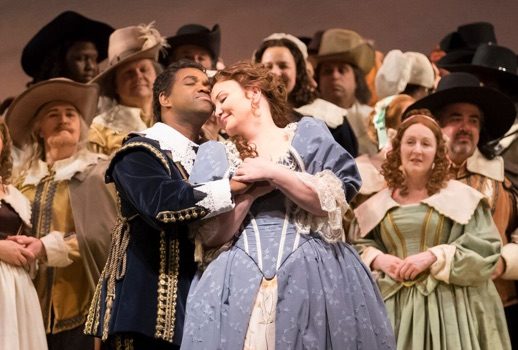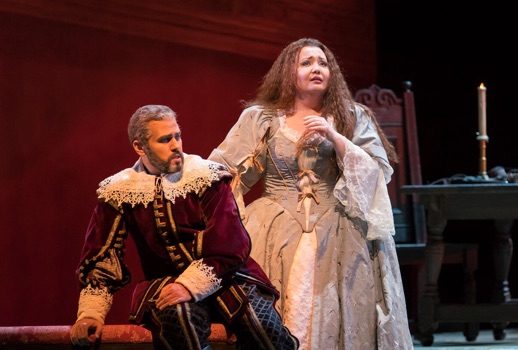
“My love for you will last as long as these costumes.”
Going to the opera in Chicago in winter can be a difficult journey. On Sunday afternoon, Lyric Opera of Chicago opened its revival of Bellini’s I puritani in the midst of a snowstorm, a gale warning, and, for us near the lake, a “Heavy Freezing Spray Warning” (a new one on me!).
Nevertheless, I bundled up and headed downtown to the warm and friendly confines of the Civic Opera House, and I was glad I did. It was an afternoon of spectacular singing, particularly from the two principals and the glorious Lyric Opera Chorus.
Lyric utilized the Metropolitan Opera’s 42-year-old Sandro Sequi production, and the colorful, almost fairy tale sets by Ming Cho Lee have held up remarkably well, as have the luxuriant, jewel-toned costumes of the late Peter J. Hall.
It’s an old-fashioned production in every way, still ravishingly beautiful, and frames Bellini’s ultra-romantic story of love and politics during Cromwell’s rebellion in England perfectly. The gorgeous and tone-perfect lighting of Chris Maravich completes a production very easy on the eyes.
You really can’t do justice to I Puritani without four splendid singers, and Lyric has them. Russian soprano Albina Shagimuratova was making her role debut as Elvira, and she exhibited a real mastery of this role that seems to fit her like a velvet glove.
As last season’s Lucia, I found her singing very fine but her acting rather bland. Not the case here—her dramatic commitment was powerful throughout and she was vocally stunning. She had it all—remarkable coloratura technique, shining clarity of tone, evenness through the registers, and high notes delivered with ease and accuracy.
She was well matched with tenor Lawrence Brownlee, also delivering clarion, glorious vocalism, with a stunning sweetness of tone from his opening aria “A te, o cara” (one of Bellini’s loveliest arias) through to act three’s “Credesi misera! Da me tradita” when he expresses that he can face death if Elvira is by his side.
I can’t imagine a better singer in today’s opera world for this role. He even managed to hit the famous F over high C in the last act, even if it was a bit of a bleat. He sang with perfect bel canto style, and he and Ms. Shagimuratova almost made a believable romance out of the improbable characters.
Elvira’s spurned suitor Sir Riccardo Forth is powerfully sung and acted by baritone Anthony Clark Evans, an alumnus of Lyric’s Ryan Opera Center. His brooding, angry first act scena where he laments the loss of Elvira’s hand is sung with burnished tone and a powerful presence.

At a few times during the opera, he seemed to lose focus and I wished for a larger sound, especially in the lowest notes that were lost in the orchestra.
Able support comes from Lauren Decker as the Queen, Alan Higgs as Elvira’s father, and Alec Carlson as Sir Bruno.
Enrique Mazzola led a stirring, detailed reading of Bellini’s complex score. He led with remarkable energy and verve, considering he’d had emergency gall bladder surgery just six days before! The Lyric Opera Orchestra responded admirably, finding all the contrasts of light and darkness in the score, adding to the lush romanticism of the music.
And the Lyric Opera Chorus under Michael Black delivered another knockout performance, singing with remarkable diction and precision.
Stage director Eric Einhorn matched the old-fashioned production with some old-fashioned stand-and-sing blocking, but he clearly understands the heart of the opera and these characters. He created stunningly beautiful stage pictures, and managed the large chorus scenes with style and precision.
A great and unusual moment happened during the mad scene, when Elvira suddenly thought that Riccardo was her absent Arturo and planted a frenzied kiss on her suitor. The moment worked beautifully.
I wasn’t so pleased with having the singers use the aisles of the theatre (for instance, the escape of Arturo and the Queen happened in the far aisles and led to some audience confusion).
But Einhorn framed the story effectively in this grand afternoon of music-making in the Loop.
Photos: Todd Rosenberg



